Charles E W Bean, Diaries, AWM38 3DRL 606/36/1 - December 1915 - January 1916 - Part 7
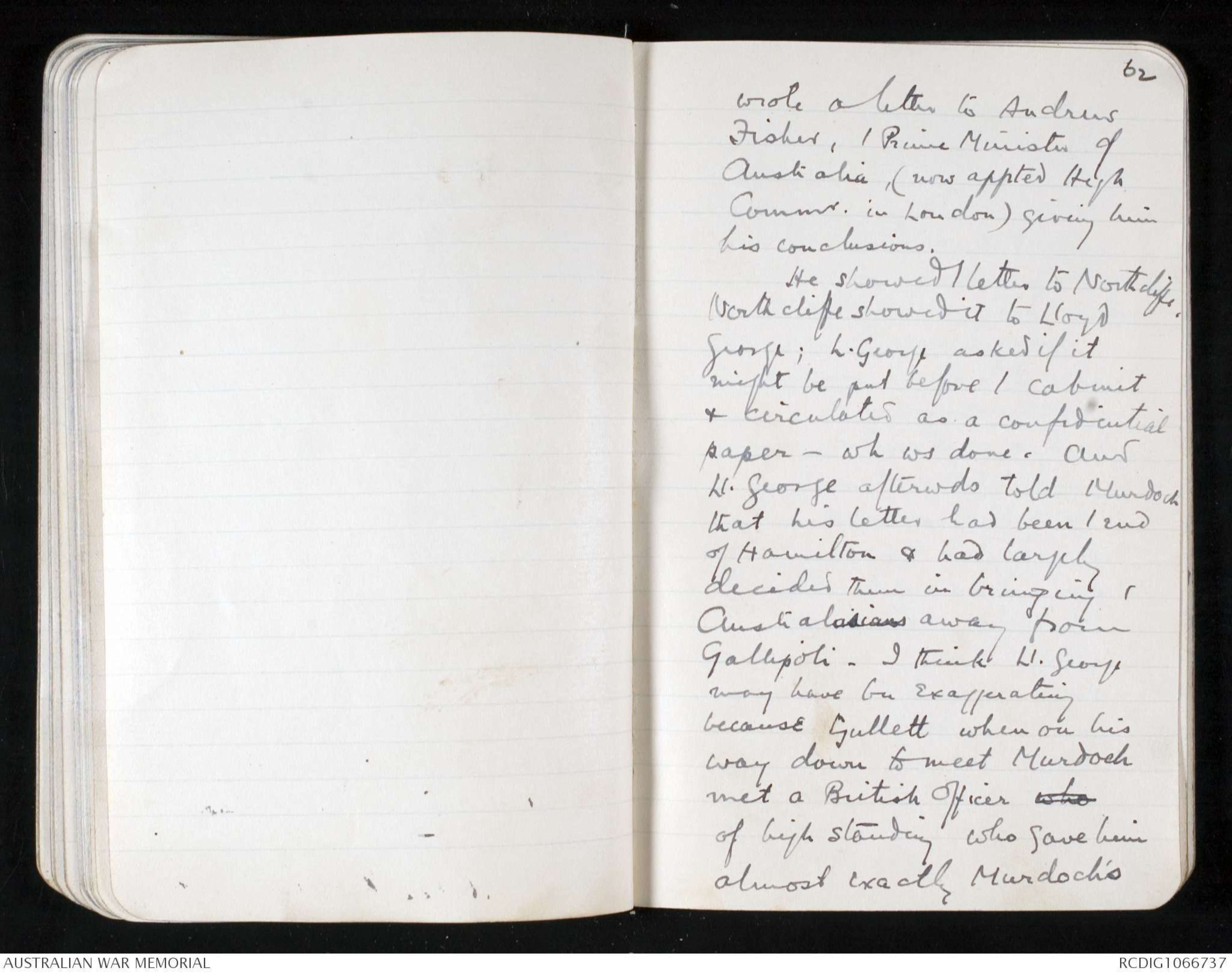
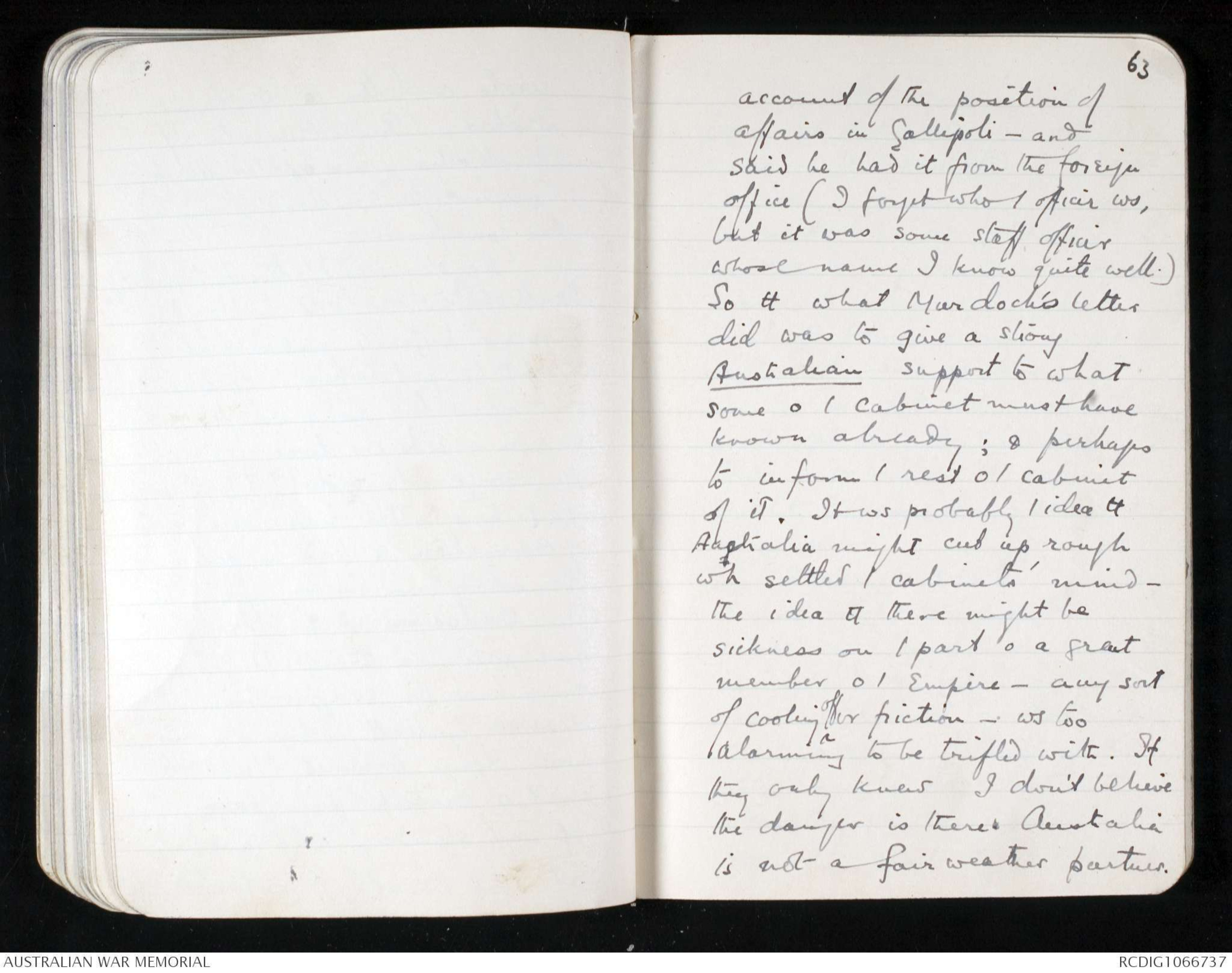
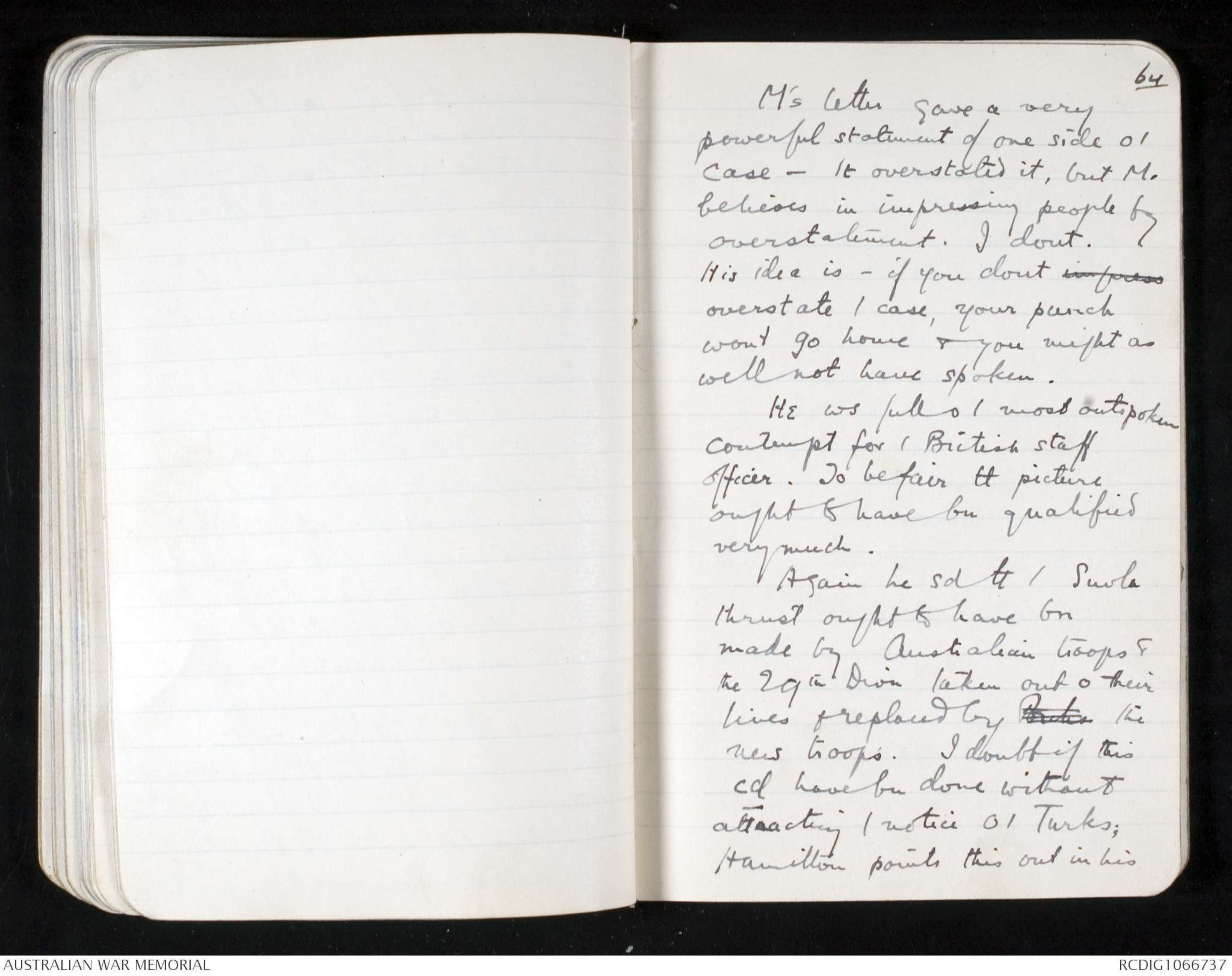
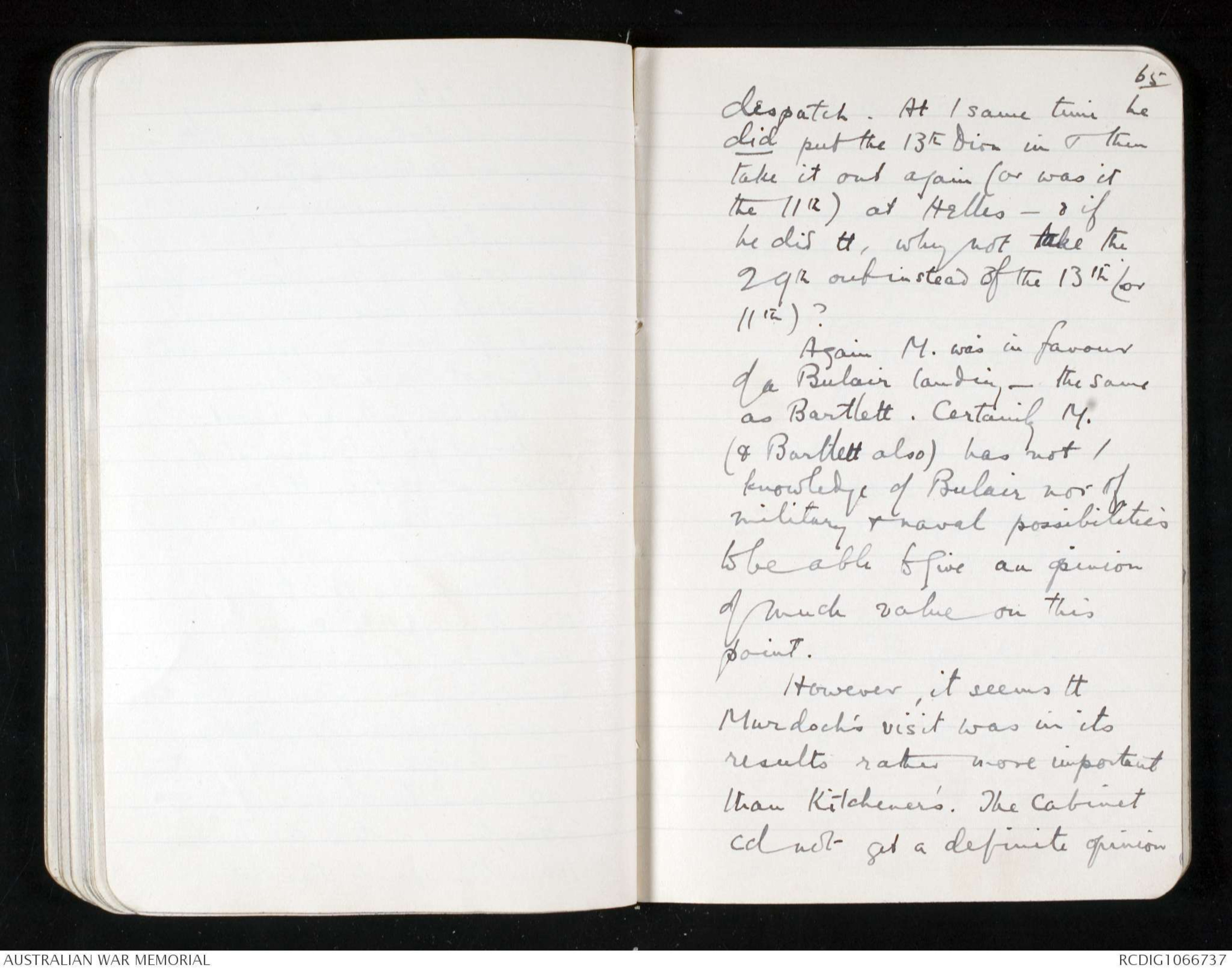
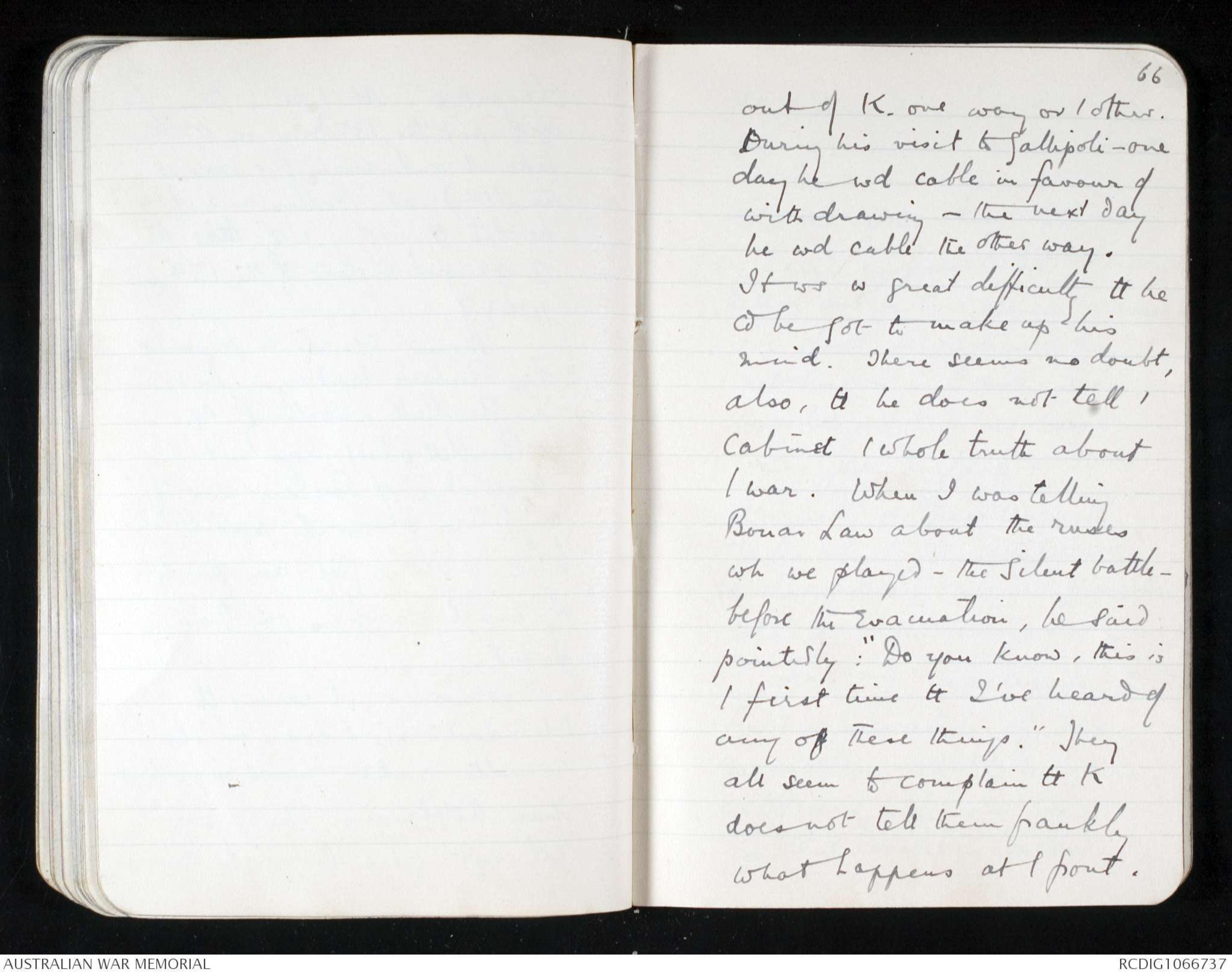
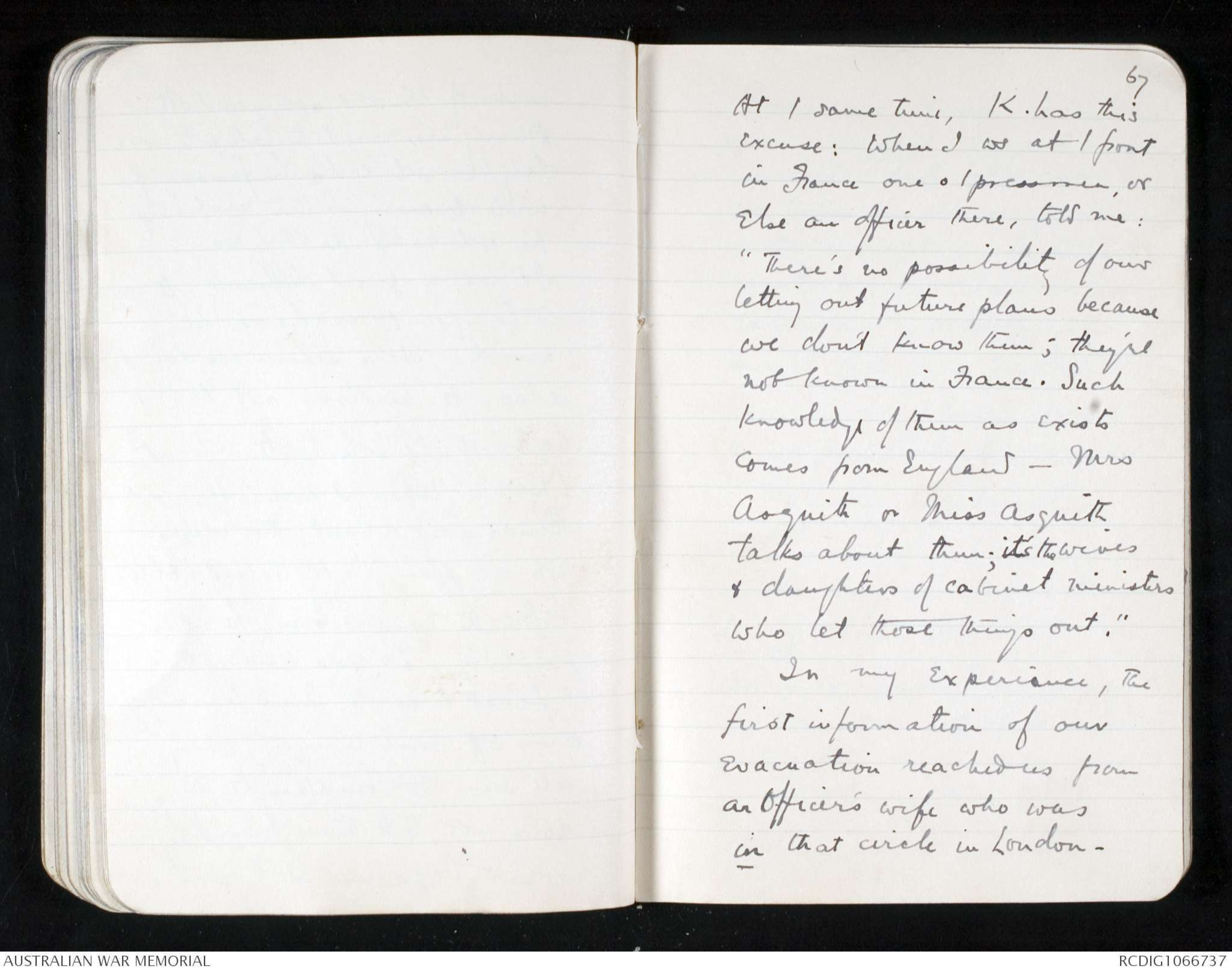
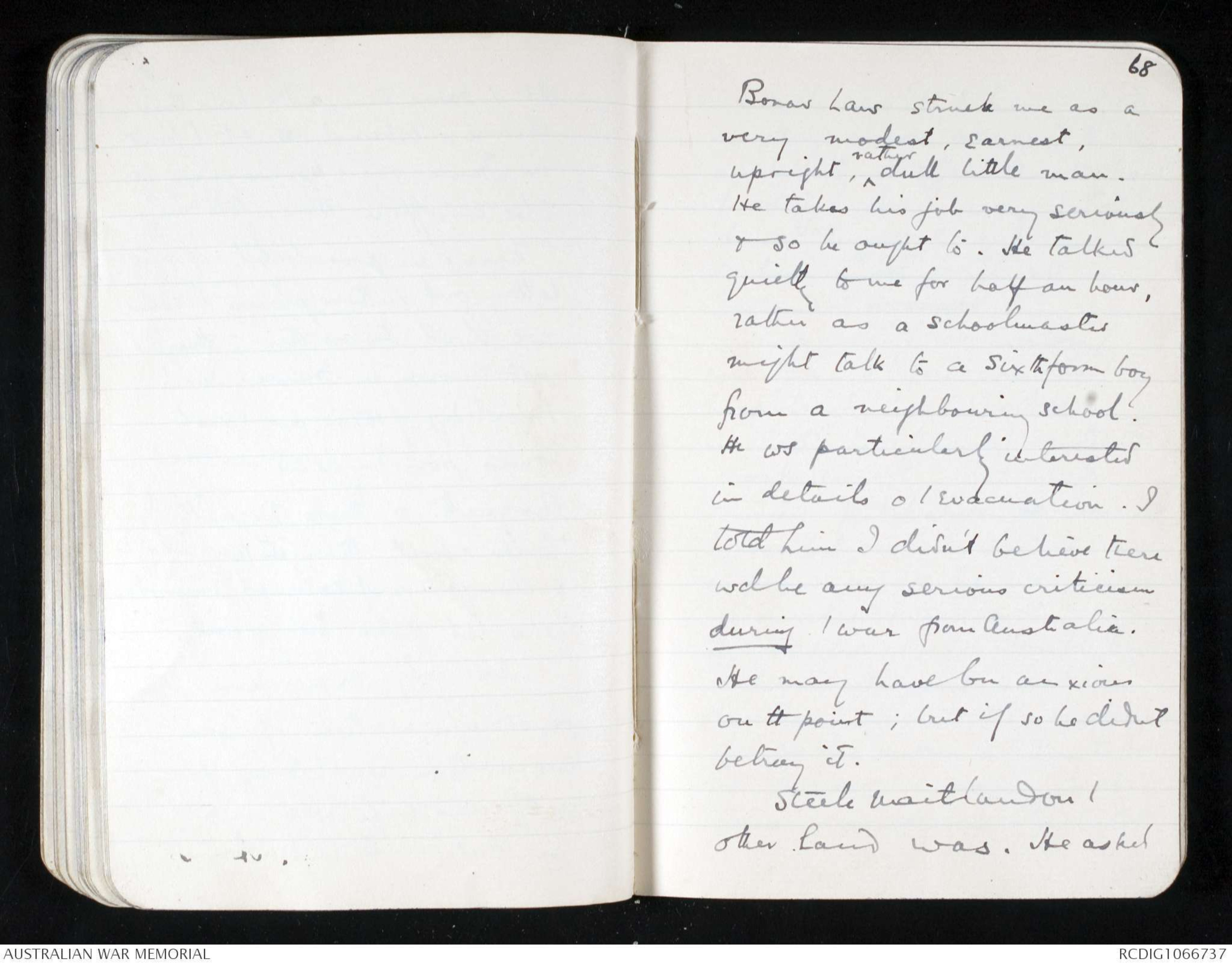
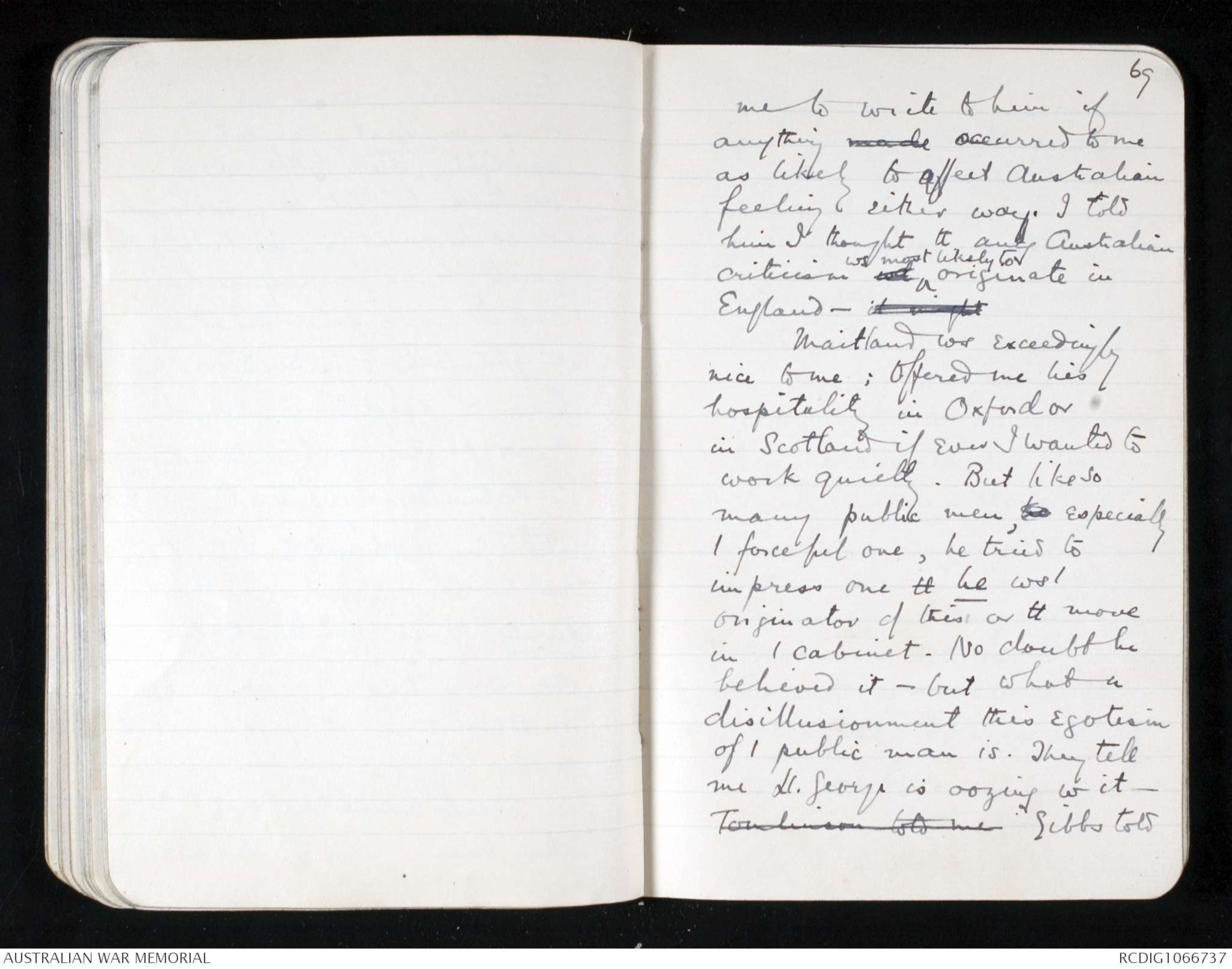
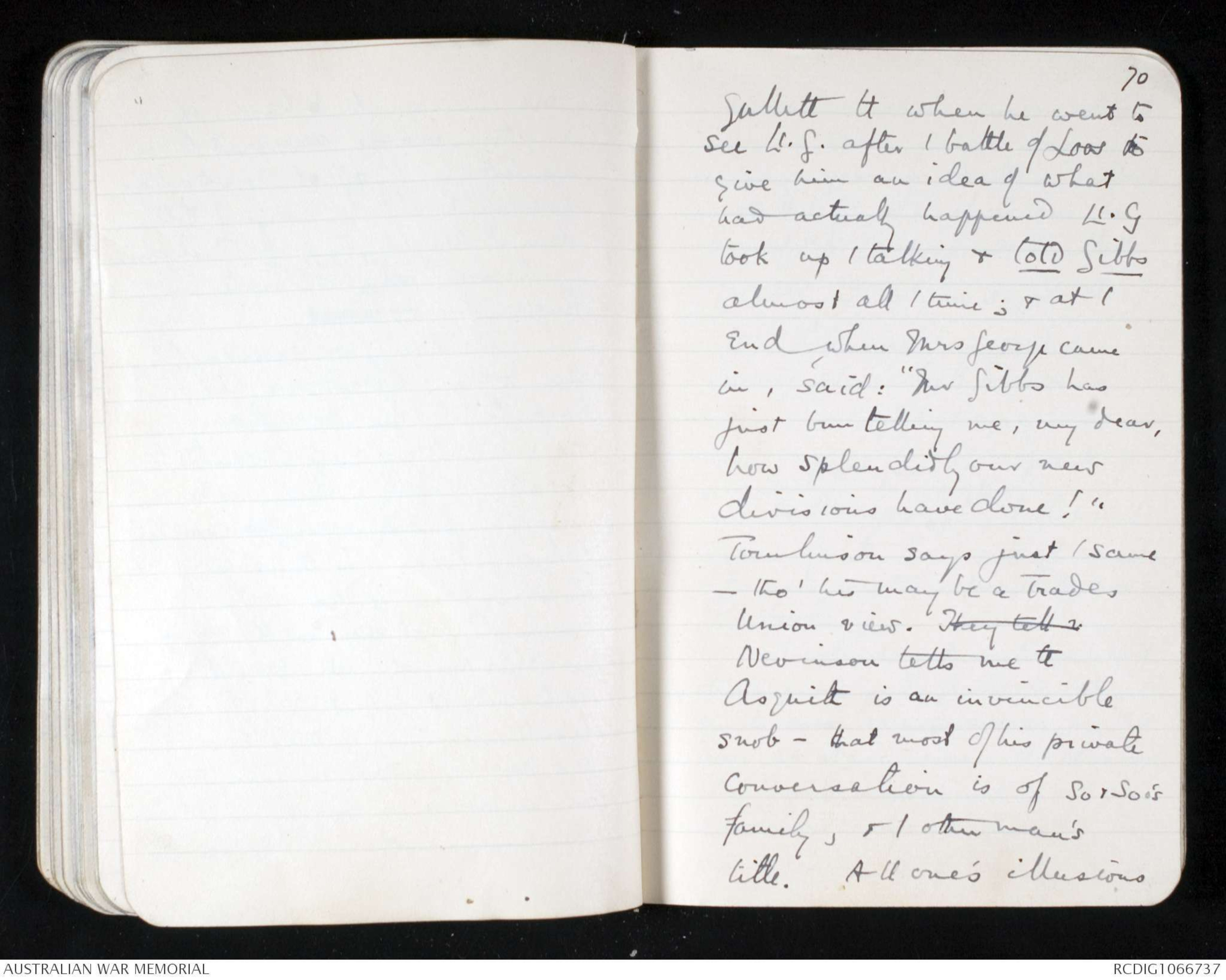
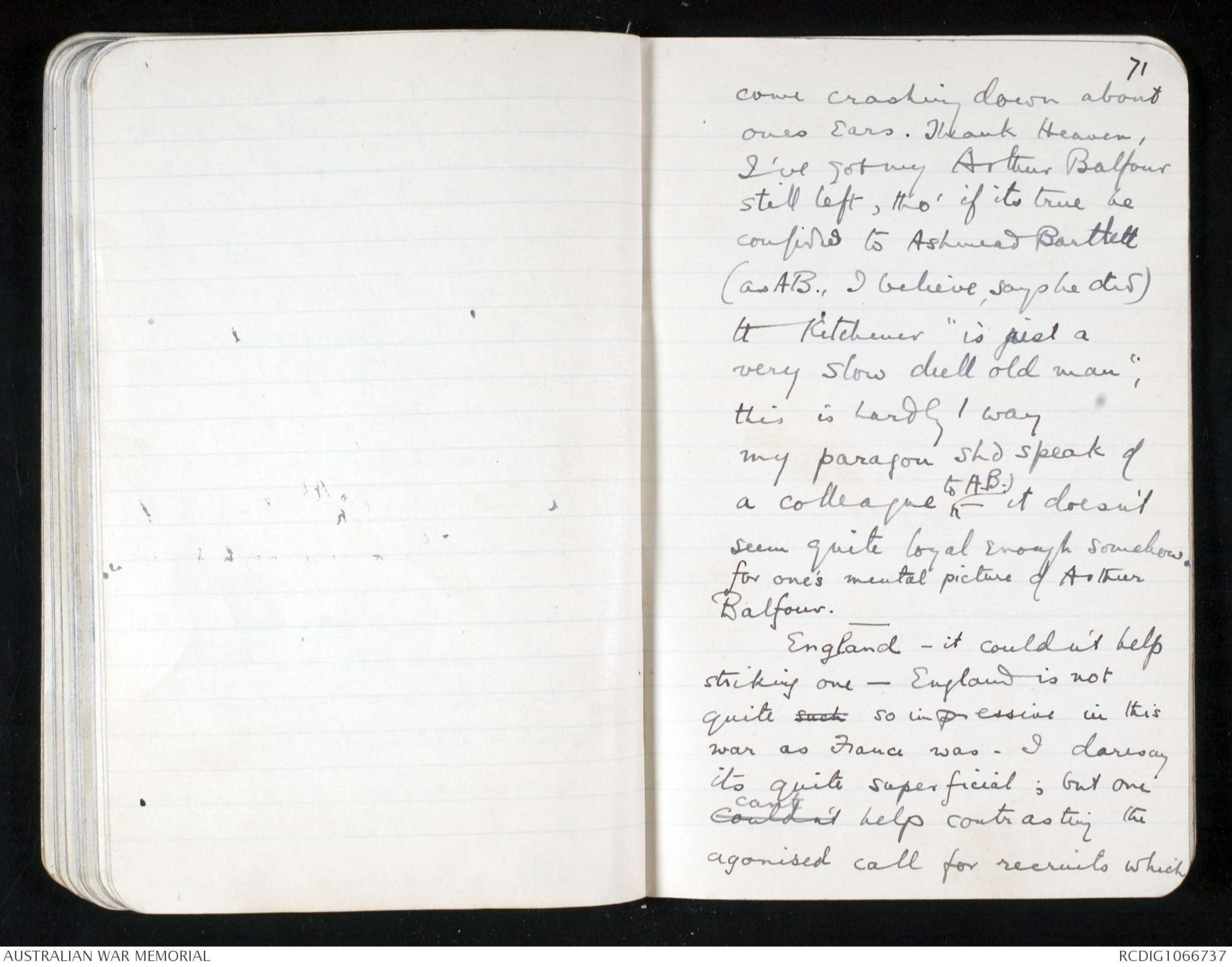
62
wrote a letter to Andrew
Fisher, / Prime Minister of
Australia, (now appted High
Commr. in London) giving him
his conclusions.
He showed / letters to Northcliffe.
Northcliffe showed it to Lloyd
George; L. George asked if it
might be put before / Cabinet
& circulated as a confidential
paper - wh ws done . And
Ll. George afterwds told Murdoch
that his letter had been / end
of Hamilton & had largely
decided them in bringing /
Australasians away from
Gallipoli. I think Ll. George
may have bn exaggerating
because Gullett when on his
way down to meet Murdoch
met a British Officer who
of high standing who gave him
almost exactly Murdoch's
63
account of the position of
affairs in Gallipoli - and
said he had it from the foreign
office (I forget who / officer ws,
but it was some staff officer
whose name I know quite well.)
So tt what Murdoch's letter
did was to give a strong
Australian support to what
some o / cabinet must have
known already; & perhaps
to inform / rest o / cabinet
of it. It ws probably / idea tt
Australia might cut up rough
wh settled / cabinets' mind-
the idea tt there might be
sickness on / part o a great
member o / Empire - any sort
of cooling ^off or friction - ws too
alarming to be trifled with. If
they only knew I don't believe
the danger is there. Australia
is not a fair weather partner.
64
M's letter gave a very
powerful statement of one side o /
case - It overstated it, but M.
believes in impressing people by
overstatement. I dont.
His idea is - if you dont impress
overstate / case, your punch
wont go home & you might as
well not have spoken.
He ws full o / most outspoken
contempt for / British staff
officer. To be fair tt picture
ought to have bn qualified
very much.
Again he sd tt / Suvla
thrust ought to have bn
made by Australian troops &
the 29th Divn taken out o their
lines & replaced by Britis the
new troops. I doubt if this
cd have bn done without
attracting / notice o / Turks;
Hamilton points this out in his
65
despatch. At / same time he
did put the 13th Divn in & then
take it out again (or was it
the 11th) at Helles - & if
he did tt, why not take the
29th out instead of the 13th (or
11th)?
Again M. was in favour
of a Bulair landing - the same
as Bartlett. Certainly M.
(& Bartlett also) has not /
knowledge of Bulair nor of
military & naval possibilities
to be able to give an opinion
of much value on this
point.
However, it seems tt
Murdoch's visit was in its
results rather more important
than Kitchener's. The Cabinet
cd not get a definite opinion
66
out of K. one way or / other.
During his visit to Gallipoli - one
day he wd cable in favour of
withdrawing- the next day
he wd cable the other way.
It ws w great difficulty tt he
cd be got to make up his
mind. There seems no doubt,
also, tt he does not tell /
Cabinet / whole truth about
/ war. When I was telling
Bonar Law about the ruses
wh we played - the Silent battle-
before the evacuation, he said
pointedly : "Do you know, this is
/ first time tt I've heard of
any of these things." They
all seem to complain tt K
does not tell them frankly
what happens at / front.
67
At / same time, K. has this
excuse: When I ws at / front
in France one o / pressmen, or
else an officer there, told me :
"There's no possibility of our
letting out future plans because
we don't know them; they're
not known in France. Such
knowledge of them as exists
comes from England - Mrs
Asquith or Miss Asquith
talks about them; it's the wives
& daughters of cabinet ministers
who let those things out."
In my experience, the
first information of our
evacuation reached us from
an Officer's wife who was
in that circle in London.
68
Bonar Law struck me as a
very modest, earnest,
upright, ^rather dull little man.
He takes his job very seriously
& so he ought to. He talked
quietly to me for half an hour,
rather as a schoolmaster
might talk to a sixth form boy
from a neighbouring school.
He was particularly interested
in details o / evacuation. I
told him I didn't believe there
wd be any serious criticism
during / war from Australia.
He may have bn anxious
on tt point; but if so he didnt
betray it.
Steele Maitland on /
other hand was. He asked
69
me to write to him if
anything made occurred to me
as likely to affect Australian
feeling either way. I told
him I thought tt any Australian
criticism ^ws most likely to wd originate in
England - it might
Maitland ws exceedingly
nice to me ; Offered me his
hospitality in Oxford or
in Scotland if ever I wanted to
work quietly. But like so
many public men, he especially
/ forceful one, he tried to
impress one tt he ws /
originator of this or tt move
in / cabinet. No doubt he
believed it - but what a
disillusionment this egotism
of / public man is. They tell
me Ll. George is oozing w it -Tomlinson told me Gibbs told
70
Gullett tt when he went to
see Ll. G. after / battle of Loos to
give him an idea of what
had actually happened Ll. G
took up / talking & told Gibbs
almost all / time ; & at /
end, when Mrs George came
in, said: "Mr Gibbs has
just been telling me, my dear,
how splendidly our new
divisions have done!"
Tomlinson says just / same
- tho' his may be a Trades
Union view. They tell v
Nevinson tells me tt
Asquith is an invincible
snob - that most of his private
conversation is of so & so's
family, & / other man's
title. All one's illusions
71
Come crashing down about
ones ears. Thank Heaven,
I've got my Arthur Balfour
still left, tho' if its true he
confided to Ashmead Bartlett
(as AB., I believe, says he did)
tt Kitchener "is just a
very slow dull old man",
this is hardly / way
my paragon shd speak of
a colleague ^to A.B. - it doesn't
seem quite loyal enough somehow,
for one's mental picture of Arthur
Balfour. -
England - it couldn't help
striking one - England is not
quite such so impressive in this
war as France was - I daresay
its quite superficial ; but onecouldn't ∧cant help contrasting the
agonised call for recruits which
 Lulu B
Lulu BThis transcription item is now locked to you for editing. To release the lock either Save your changes or Cancel.
This lock will be automatically released after 60 minutes of inactivity.